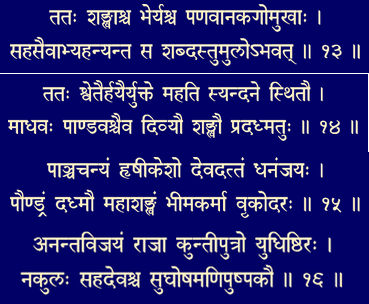13-Then following Bhishma-the head commander of Kauravas, different kinds of war instruments conches and tabors, trumpets and cowhorns blared forth suddenly from the Kaurava side, that sound was tremendous.
14-Thereafter, Mâdhava and Pândavas too, riding on their magnificent chariot yoked with white horses, blew their divine conches arousing fear in the enemies.
15-Hrishikesha blew the Pânchajanya, Dhananjaya, the Devadatta, and (Bhima), the doer of terrific deeds blew his large conch Paundra.
16-King Yudhishthira, son of Kunti, blew the conch named Anantavijaya, and Nakula and Sahadeva, their Sughosha and Manipushpaka.
In previous verse Duryodhan spoke about the strength of his army and now he tells Dron what the army of Pandvas did in the battle field. Just after Bhishma’s and his army had blown their conches, Pandava army also sounded their great battle sounds. He mentions the name of conches of Pandava’s because in his army such great sound making conches did not exist. Panchajanya is the name of Lord Krishna’s divine conch shell which is made of sacred mantras and the other names mentioned are Devadatta of Arjuna, Paundra of Bhima, Anathvijaya of the King Yudhishthir (with Yudhishthir’s conch Anantvijaya “Raja” is specifically used as he was the king of Pandava army. Yudhishthir received Raja title after Rajsuya Yajna), Sughosh of Nakul and Manipushpaka of Sahdeva-these conch shells of Pandavas were famous and well known to the enemies.
Duryodhan did not mention the chariots of his own army but he motions Arjuna’s chariot because it was a very special chariot. There are three reasons behind his mention: first is that the chariot was designed and built by Visvakarma- the architect of the demigods, and thus it was especially powerful; second reason is that it was gifted by Agni and third reason is that Sri Krishna was the charioteer and thus it was divine and unconquerable.
